13 Jul 2011
The evolving Transition ingredients card game
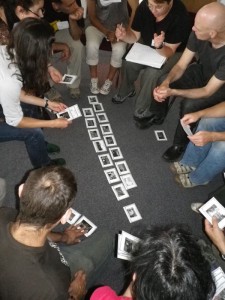 At my workshop at the Transition Network conference I tried out a new teaching tool for Transition initiatives, a deck of cards designed around the ‘Ingredients of Transition’, as set out in the forthcoming ‘The Transition Companion’. On one side of the cards is a photo that captures the spirit of the ingredient and its name, and on the other side is the problem the ingredient is a response to and the solution it represents. Here, for example, are both sides of the ‘Coming together as groups’.
At my workshop at the Transition Network conference I tried out a new teaching tool for Transition initiatives, a deck of cards designed around the ‘Ingredients of Transition’, as set out in the forthcoming ‘The Transition Companion’. On one side of the cards is a photo that captures the spirit of the ingredient and its name, and on the other side is the problem the ingredient is a response to and the solution it represents. Here, for example, are both sides of the ‘Coming together as groups’.
My sense, prior to the workshop, was that they might serve as a useful tool for initiatives. So, the first activity we did was based on the ‘mingle’ activity from the Transition Training. The cards were dealt out so that everyone had one, and then they were invited to move around the room, and to explain their card to someone else, and to hear that person’s card before moving on to another person. It was a great way to familiarise people quickly with the idea of the ingredients and to expose them to quite a few of them.
For the second game, people got into groups of 10-15 people, and dealt the cards out between them. Then one person volunteered to tell the story of their initiative. The idea was then to map out that story on the floor using the cards. “We started with this, then moved on to that”, and so on.
Each group laid the cards out in a different way, but kept with the same idea of creating a storyline of how their initiative unfolded. Some of the fascinating things were the reflections at the end of the exercise in terms of which cards were left unused, and what they said about the stages of the process that had been overlooked. Also, the cards that were used to map out where they saw the group going next were very instructive.
A tool like this could be used in other ways too. Perhaps they could be used to initially map out a vision of where the initiative would like to get to in 5 years time, and then used to set out the necessary steps to getting there. There could be a 10 minute activity you could do with them, a 40 minute activity, and a more in-depth 2 hour game. They could be used to map what feels like it’s working well, as well as what isn’t.
One of the people whose project was mapped out said she found it a hugely useful and insightful tool in terms of getting a sense of why things had gone flat and what could be done about it. What I’d love would be to develop this tool in time for the release of the book. Perhaps we’d release it as a ‘beta’ version first, and invite people to try them out and send in the games they come up with. If you have any thoughts as to how to make these the most useful and effective tool possible, I’d love to hear them. Certainly the response from the workshop seemed to be that we have the bones of a potentially really dynamic tool here.
Finally, here is a short film of me chatting about these cards and their potential with Charlotte DuCann of Sustainable Bungay…
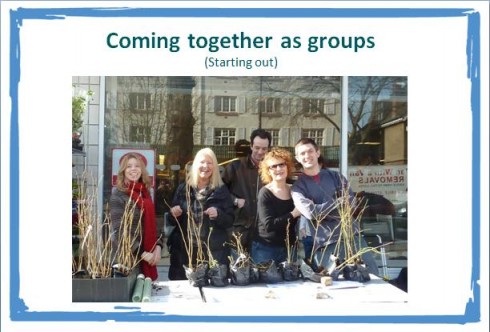
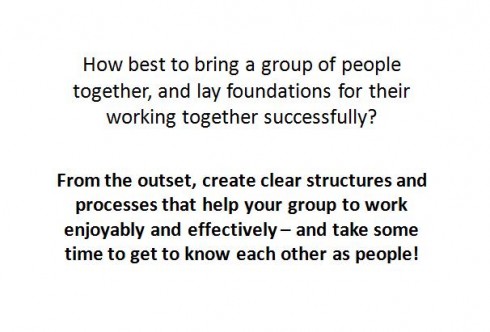
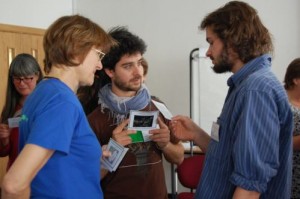
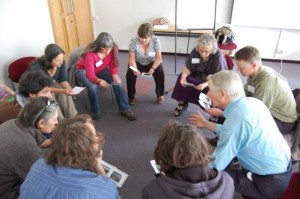
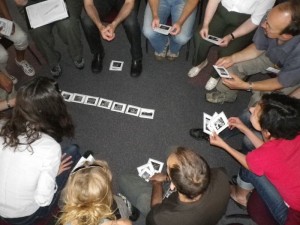
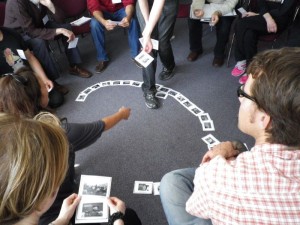
Tony Buck
13 Jul 7:50pm
Because I’m considering helping to start a Transition initiative in Coatesville, PA, USA, I realized that a modified version of the cards might work in the awareness raising stage. For instance, instead of giving a presentation on peak oil, climate change, etc., to a new group, why not hand out the cards to the attendees, with all the new ideas and challenges on, and let the group tell each other, from the cards, about these things and then assemble the group and ask, “Any further questions?”
Shaun Bartone
14 Jul 6:06pm
One of the issues I’ve noticed from doing Transition and observing Transition is problems with this whole idea of “visioning.” I started out believing that there was some kind of ‘end point’ or ‘end state’ when you and your fellows had done everything you could to be ready for the coming hardships (whether peak oil, climate or economic deterioration), and then you were “done.” But there never is an “end state.” Collapse means that the situation is continuously evolving. You can’t guess what things what things will look like in the future because collapse is chaotic and unpredictable by nature. So you are always in a state of ‘transitioning.” Sometime its a very active state, as when you face a crisis. Right now in my area we’re working hard to stop shale gas drilling because it will make us sick and poison our water supply and destroy our arable land and ecosystem. So right now we’re very active. But there are also times when not much is happening, when the pace of “transitioning” is slow, even boring. That’s when it’s time to focus on cultural activities, celebration, fun, creating, experimenting, trying new things you otherwise don’t have time for. I think an important “ingredient” of Transition is how one’s sense of TIME changes, getting familiar and comfortable with the fast and slow times, the crises and the boredom, the exciting and the routine. But also knowing that we will be in a continuous state of transition for the rest of our lives. My opinion is that this transition state is one of intense social evolution, and that we need to reflect on not only how we are dealing with changing conditions, but also how we are changing and evolving as human beings and as a society.
Shaun Bartone
14 Jul 6:24pm
and with regard to Time as an ingredient, you also have to get comfortable with the “long and short of it.” There are Transition activities that we will do immediately, in the first 3-6 months, in the intermediate, the first 1, 3 or 5 years. And then there are activities or tends that will take place over decades, right through the end of our own lives, into future generations. There will be both changing conditions and trends that will go on for many decades or longer, and there are responses to those changes that will go on for many decades, even a century or more. It’s important to become familiar with the different time scales that occur with the kind of large-scale global changes that we are now undergoing. We need to teach people that we’re in it for the long haul, for the rest of our lives, and our children’s lives; that though there may be crises that demand immediate fast action, the Time of Transition is really on a long scale, an historic scale, and that we have to be patient with this longer-scale process of human evolution. It’s funny, because the name of the radio show that I started in relation to this is called Transition Times.
Carin Schwartz
16 Jul 6:58pm
I found this ‘game’ hugely beneficial at the conference and would very much welcome a beta testing deck of cards to take to groups around the north of Scotland. I think Development Trusts could be another group of interested people, even if they’re not officially ‘transition groups’, in other words – this is a game that transcends the network. You’ve created a tool for group dynamics in the most positive sense. Fantastic.
Shaun Bartone
17 Jul 3:37pm
Another important ‘ingredient’ of Transition: trial and error. In a world of increasing uncertainty, the most crucial method for evolving into a new culture that can adapt to these chaotic conditions is “trial and error.” We can guess about what the future will bring, but we don’t really know, and we also don’t really know if what we’re doing will work (as Transition always says). Tim Hartford, in the TED talk below, argues that the most effective approach is to say “I don’t know, let’s try a bunch of things and see what works.” You get good at trial and error when you get to the point of making “good mistakes” that teach you a lot.
http://www.ted.com/talks/tim_harford.html